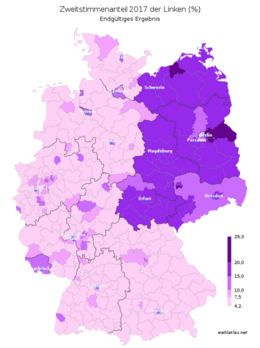Opinions of socialism in former socialist states: Difference between revisions
Harrystein (talk | contribs) m (ce) |
Harrystein (talk | contribs) No edit summary |
||
| Line 1: | Line 1: | ||
{{Former socialist states sidebar}} | It is a popular misconception in [[Western world|Western countries]] that people who directly experienced the [[Collapse of the Eastern Bloc|fall of the Eastern Bloc]] in 1991 and the subsequent transition to a globally integrated, Westernized political and economic system primarily, or even overwhelmingly, approve of the changes of the last thirty years. In fact, '''opinions of socialism in former socialist states''' vary considerably by country, age group, income, and education, and formal polling presents a far more complicated, divided picture. People in [[Poland]] and the [[Baltic states]] are far more likely to support the changes to their societies than citizens of [[Russian Federation|Russia]], [[Bulgaria]], [[Ukraine]], or the [[former Yugoslavia]].{{Former socialist states sidebar}} | ||
== Views on political liberalism == | |||
Multi-party elections are one of the most consistent areas of support among people in former socialist countries, remaining popular since 1991 and through the 2000s. Liberal political rights, such as freedom of speech and freedom of the press, are also strongly supported. | |||
However, when asked about the actual results of this newfound freedom in their day-to-day life, people express cynicism towards their politicians and political systems which is comparable to those views in Western countries. | |||
== Support for socialist and communist parties == | == Support for socialist and communist parties == | ||
=== Russia === | === Russia === | ||
{{main|Communist Party of the Russian Federation}} | {{main|Communist Party of the Russian Federation}}The [[Communist Party of the Russian Federation]] has remained popular since its formation in 1993 to replace the CPSU. In the 1996 Russian presidential election, the [[Neoliberalism|neoliberal]] candidate [[Boris Yeltsin]] received both open and covert support from the [[United States of America|United States]] in order to prevent a Communist victory. | ||
=== Germany === | === Germany === | ||
Latest revision as of 00:22, 9 May 2024
It is a popular misconception in Western countries that people who directly experienced the fall of the Eastern Bloc in 1991 and the subsequent transition to a globally integrated, Westernized political and economic system primarily, or even overwhelmingly, approve of the changes of the last thirty years. In fact, opinions of socialism in former socialist states vary considerably by country, age group, income, and education, and formal polling presents a far more complicated, divided picture. People in Poland and the Baltic states are far more likely to support the changes to their societies than citizens of Russia, Bulgaria, Ukraine, or the former Yugoslavia.
| Part of a series on |
| Former socialist states |
|---|
| List of states |
|
Albania · Bulgaria · Czech Republic · Slovakia · Germany · Hungary · Mongolia · Poland · Romania · Former Soviet Union (Armenia · Azerbaijan · Belarus · Estonia · Georgia · Kazakhstan · Kyrgyzstan · Latvia · Lithuania · Moldova · Russia · Tajikistan · Turkmenistan · Ukraine · Uzbekistan) |
| Politics |
| Opinions of socialism · Reactionism (Eurasianism · National Bolshevism · Religion · Decommunization · Anti-communist propaganda · Banderism) · Western influence (NATO expansion · Color revolutions) |
| Issues |
| Demographic crisis · Economic issues · Poverty · Post-Soviet conflicts |
Views on political liberalism
Multi-party elections are one of the most consistent areas of support among people in former socialist countries, remaining popular since 1991 and through the 2000s. Liberal political rights, such as freedom of speech and freedom of the press, are also strongly supported.
However, when asked about the actual results of this newfound freedom in their day-to-day life, people express cynicism towards their politicians and political systems which is comparable to those views in Western countries.
Support for socialist and communist parties
Russia
The Communist Party of the Russian Federation has remained popular since its formation in 1993 to replace the CPSU. In the 1996 Russian presidential election, the neoliberal candidate Boris Yeltsin received both open and covert support from the United States in order to prevent a Communist victory.
Germany

Germans living in the former East are less likely to support liberal mainstream parties, opting instead to support leftist parties like Die Linke as well as the far-right anti-immigrant party Alternative für Deutschland.
Generational gap
People old enough to remember life before the crisis of the 1980s and the capitalist era have consistently more positive views of the system they experienced firsthand than people born after 1980.